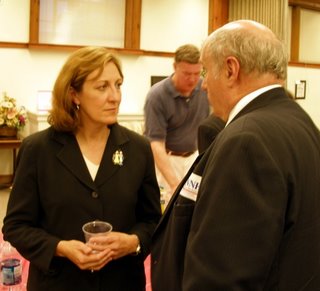Secty of State: Brunner (D) Speaks to City Democratic Clubs
 Tonight I attended a joint meeting of the Cleveland Heights, Shaker Heights, and Beachwood Democratic Clubs, with guests from Cleveland Wards 3 and 4 as well, where Secretary of State candidate Jennifer Brunner (D-Columbus) was the featured speaker. Auditor candidate Rep. Barbara Sykes had also been advertised as a speaker, but she did not attend and no explanation for that was provided.
Tonight I attended a joint meeting of the Cleveland Heights, Shaker Heights, and Beachwood Democratic Clubs, with guests from Cleveland Wards 3 and 4 as well, where Secretary of State candidate Jennifer Brunner (D-Columbus) was the featured speaker. Auditor candidate Rep. Barbara Sykes had also been advertised as a speaker, but she did not attend and no explanation for that was provided.Brunner opened her talk by saying that she wants to restore trust in the election process and change the way that current Secretary of State Ken Blackwell (R-Cincinnati) runs elections. She has solid credentials for the task. She served as legal counsel to U.S. Senate candidate Rep. Sherrod Brown (D-Avon) when he was Secretary of State, served on the Franklin County Board of Elections, and was a judge on the Franklin County Court of Common Pleas, having defeated the governor's choice for a judgeship in 2000 and won re-election in 2002. (Sherrod Brown was 29 when he was elected Secretary of State, while Brunner is now 49.) She says that the fact that she was a judge shows that she will be fair, and the fact that she left her judgeship shows that she is committed.
Brunner said that Blackwell has abdicated responsibility for problems in elections. He has bascially said to county Boards of Election, "come up with your own solutions," so that Blackwell cannot be blamed and Blackwell can instead blame the boards when things go wrong. In the case of the Cuyahoga County Board of Elections, however, this strategy is hampered by the fact that the chairman of the board is Bob Bennett, who is also chairman of the Ohio Republican Party. This is why the Cuyahoga board is proceeding with its own investigation of what went wrong in the May primary, instead of being subjected to an investigation by Blackwell's staffers.
Referring to the 2004 general election, Brunner recounted how Blackwell was ordered by a court at 4:00 pm on election day to allow people who had requested an absentee ballot but hadn't received one by that day to vote by casting provisional ballots. However, Blackwell went to court after election day and got an order that prevented those absentee ballots from being counted. Brunner said, "We'll never know if the election would have been different, because the effect of what Ken Blackwell did can't be quantified." She met with presidential candidate John Kerry after the 2004 election and told him that while Blackwell did various things to affect the outcome of the election, those things were done legally.
Talking about what she would do specifically to make elections better, Brunner focused on having better poll workers. She advocates better training (including better videos and manuals), more uniformity of procedures among counties, and using split shifts so that people aren't deterred from becoming poll workers by the 14 hour day. Younger poll workers are needed. She also said that the Secretary of State needs teams of investigators for checking into instances of alleged voter intimidation. Talking about the non-election functions of the Secretary of State, Brunner criticized Blackwell for outsourcing 100 jobs in the area of UCC filings, which resulted in thousands of social security numbers ending up online. She also talked about her recently proposed five-point plan for combatting identity fraud, including a certification that would help victims clear their credit.
Some of the most interesting things Brunner talked about came up during the question and answer period. On the topic of electronic voting machines, she said that her reading leads her to believe that the source code of such machines should be open, but the issue requires further study. While HB 3 does not allow voting machines to be connected to the internet, Brunner is concerned that the machines may be vulnerable to manipulation through infrared access (such as Bluetooth technology). To her, the perfect machine would be one that allows the voter to touch the screen to input information, then uses the information to fill out a numbered paper form that the voter can see, feel, and touch, which form would then be counted on an optical scanner. However, with millions having been spent on electronic voting machines, she said, we are probably stuck with the ones we have. She said that she is open to innovations such as mail-in voting, as is done in Oregon and has resulted in 90% participation, but that she would never advocate internet voting. She is open to the concept of voting on the weekend or on a holiday so that more people would vote and poll hours would not need to be so long, but she pointed out that this would probably require a constitutional amendment. As Secretary of State she would advocate for repeal of the voter ID requirement in HB 3, and in fact testified against it before the law was passed. She said that there is a lawsuit being prepared to try to stop the voter ID requirement before the general election. If she is stuck with the voter ID requirement as Secretary of State, she declared, she could issue the IDs at the voting place.







0 Comments:
Post a Comment
<< Home